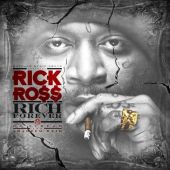
Rick Ross
Rich Forever Mixtape
(Self-released; 2012)
By Colin McGowan | 7 February 2012
I want give myself over to Rick Ross—cop to conversion and dream of cocaine-colored yachts while “Aston Martin Music” shimmers in the background. More than a few critics who dismissed the Miami’s rappers early career output as maladroit trap-hop bullshit now regard him as the master of the aesthetic. Around the time Deeper Than Rap (2009) dropped, Rawse affection became, if not widely popular, something more than a murmur. Then came Teflon Don (2010), which rap nerd god-king Sean Fennessey called a ““beautiful product of self-mythology,” and over which much shit was lost. Since Don, Ross has released little else but undeniable heat. His turns on “I’m on One,” “Tupac Back,” and “I’ma Boss” sound like Old Testament Yahweh inhabiting a miasma of purple haze.
It’s difficult to argue that Ross hasn’t usurped Jeezy as the biggest street rapper alive, especially after Young took four years to release an album that’s kind of a mess. Rich Forever, for Rozayphiles, can only solidify that reality. Largely forsaking South Beach slink in favor of Lugerian thump, Rich Forever certainly feels titanic, like Ricky’s gone supernova and started eating gold-plated planets for lunch.
But the music comes from a small, quivering place. I don’t care about Ross’s history as a corrections officer, but I think it informs the way he approaches music. Because he’s obsessed with convincing the listener that he’s not a pathological liar, he’s a purveyor in the purest form, and the way he’s going to sell you Rick Ross: Former Cocaine-Dealing Megadon is by bludgeoning you over the head with dubious credentials until you relent. In Devin Friedman’s fascinating GQ profile of Ross, he mentions that the only time he wasn’t wrapped in a cocoon of Rozay’s charm was when Ross started prattling on about his how he grew up in Miami’s bloody underworld. Either Ross is delusional or the public knows only half the story, but his fervent desire to convince us that he owns several guns with bodies on them is, as Friedman puts it, “boring.”
At times, it renders his music boring as well. This need to be accepted as legitimate pulses through Ross, and it handcuffs his music, which always has to be about the Rick Ross that William Roberts has created. Which is a shame because Ross’s immeasurable growth as a rapper reveals that he’s capable of more than building archetypes. It’s obviously impossible to articulate sound in written word, but on opener “Holy Ghost,” he unfurls, “Work: exactly what I’m screamin’, hoe / Certified 8-digit nigga triple-beamin’, hoe” which sounds like a Slinky stretching and recoiling as it moves down a marble staircase. It’s the type of nimbleness Rozay’s flow lacked a couple years ago. This same nimbleness fashions the minimal, whirring “High Definition” into one of the tape’s best tracks. There’s something so phonetically satisfying about hearing a heavy voice like Ross’s twinkle-toes through “Got the 40 by my dick, I keep on pissin’ on the hammer / When they talkin’ slick, I double back with the banana.” When he gets lost in his language and flow, the tough-talk becomes secondary, and we watch the fat man pop triple salchows over sheets of icy horns.
I wrote in my notes a few days ago that Rich Forever attains monotony by the middle of its runtime. But the reality is a lot of the tape’s sagging gut is more or less as engaging and thunderous as the front end, but when digested in full, the tracks—almost uniformly hard, thudding trap-hop—blend together and Rich Forever becomes a slog. Any twenty-minute stretch of the tape is fine on its own—exhilarating, sometimes—but sitting through eighty minutes of this stuff is like trying to ingest a 7-11’s worth of beef jerky.
One of the few times Ross steps away from the claustrophobia of synthesized instruments and 808s comes on the tape’s title track, which functions as the now-standard wistful track about “how far we’ve come” that features on each of Ross’s albums. It’s all bleating strings, chunky self-mythology, and pap (read: John Legend), and while sonically it’s different from anything else on Rich Forever, it’s a product of the same insecurity machine that produces the rest of the tape’s insistent cajoling. Ross is more of a myth-builder than a rapper, which wouldn’t be so irksome if he didn’t possess the capability to be a great rapper. Why do Rick Ross and the man from whom the moniker was lifted have to be the same person? I hope Rozay solves that quandary. And soon.





